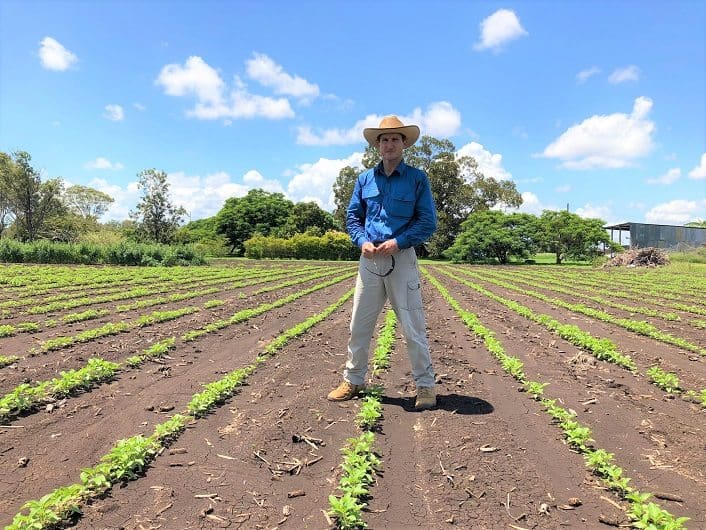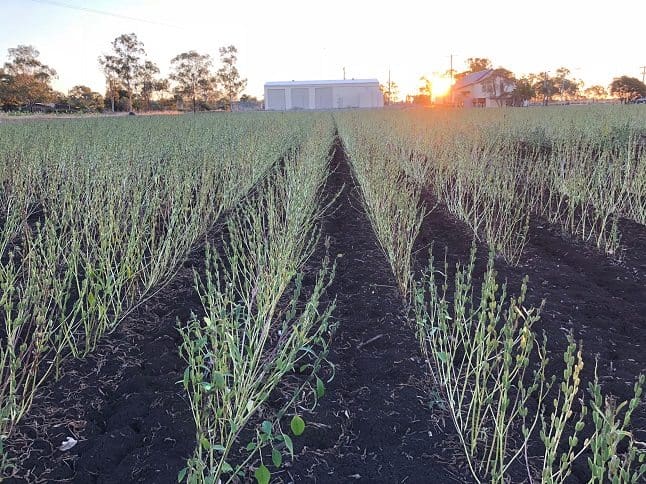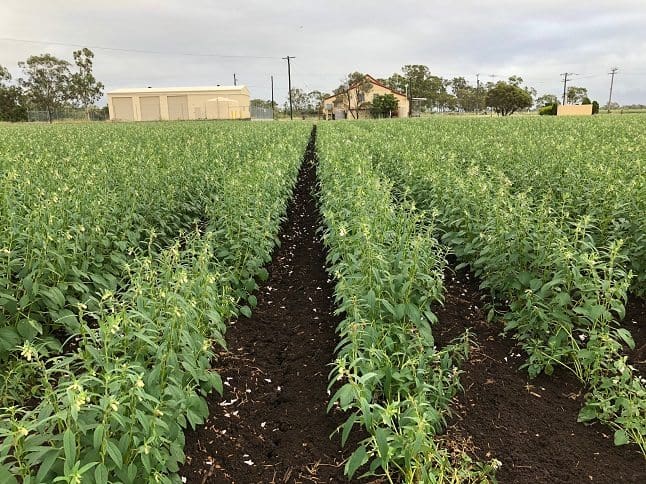BLACK sesame is showing early promise as a speciality cropping option for Australian farmers, with trials near Rockhampton in Queensland revealing its credentials, particularly its capacity to perform in tough, dry seasons.

Rockhampton dryland cropping farmer, Peter Foxwell, in the one-metre rows of a commercial black sesame seed-increase trial shortly after crop emergence on his farm, Alton Downs.
While still early days, proponents believe the high-value crop could have a place in Australian farming systems, especially if markets can be secured in South-East Asia where it is highly sought-after.
Central Queensland (CQ) University, in conjunction with agricultural seed technology and development company, AgriVentis, have been running trials on Foxwell Farming’s Alton Downs near Rockhampton to assess the viability of the crop.
There are two levels of trials:
- a varietal trial of 12 black sesame varieties which was harvested last week.
- a 16-hectare commercial trial, involving staggered plantings, the first of which should be ready for harvest by the end of May, the remaining a fortnight later.
CQ University researcher, Dr Surya Bhattarai, said one of the key findings of this summer’s trial was the impressive drought-tolerance characteristics of black sesame.
“From November to date there have been only 237 millimetres of rain in the on-site weather station. But the sesame crop has produced a reasonably attractive yield. So, it could be a crop that is resilient to drought,” he said.
“While old records show it has produced about 14 tonnes/hectare in Italy, yields in Australia will not be anywhere near that. We will be happy if we get 2t/ha.”
Dr Bhattarai said the crop had been in Australia for some time and had been trialled by different agencies.
“The hope is we now have the right varieties and the marketing is being targeted at the very high-value end.”
There had been substantial work done on varieties in previous trials in northern NSW, Central Queensland, North Queensland, Katherine in the Northern Territory and parts of Western Australia.
He said the point of difference this time around was that the Rockhampton trial was solely black sesame varieties and there was a company, AgriVentis, involved in looking into the research, development and marketing.
“In the past, there was a lot of work with field trials but the marketing was not tied up well, so the crop didn’t really go ahead,” he said.
“The hope is we now have the right varieties and the marketing is being targeted at the very high-value end. Therefore, the compromise in yield will be compensated by the high market value.
“There is a small, very specialised but very high value market for sesame with a black seed coat. That market is localised around Japan, Korea, Singapore, China and the South-East Asian region.”
Market potential
AgriVentis head of agriculture and research, Professor Paul Stewart, said they had been “inundated” with inquiries from Asian grain buyers seeking out future buying opportunities in Australia for black sesame.
“It brought home to us the fact they have a need for our crops because the majority of the market is under-supplied, and in some cases has been so for over 10 years,” he said.
Professor Stewart said black sesame was an attractive option because of the grain’s high oleic oil content, plus there had also been inquiries from India and Nepal for bales of the crop’s residues, such as stems and leaves.
With Australia currently importing 94 per cent of its spices and condiments, including 100 per cent of black sesame, AgriVentis is working to identify suitable regions to produce the crop, not only for export, but as a domestic import-replacement opportunity.
On-farm trials
Rockhampton dryland cropping farmer, Peter Foxwell, has kept a close eye on the black sesame trials on his farm, Alton Downs, including 16 hectares that are growing under contract to AgriVentis as a seed-increase crop.
Mr Foxwell said he was particularly impressed with the crop’s performance under very dry conditions and saw it as having a potential fit as a rotation option in his summer cropping program.
“This year it has been remarkable. I’m amazed at the health of the crop and the way it has grown through what is one of the drier years we have ever had. It seems to be using less water than the cotton,” he said.
“In the end it will depend on what it yields and what the price might be for a commercial crop and how it relates to cotton.
“We have black, self-mulching clay. I think it will fit quite well in a rotation with cotton or corn. We are predominantly summer rain here and have a fairly large planting window we might be able to use. It will all depend on what it returns.
“It is early days, but it is showing great promise. I think it will fit in quite well if they can establish a decent market for it.”
 Mr Foxwell said it had been a relatively straightforward crop to plant and manage, although there were some agronomic issues, such as weed control options.
Mr Foxwell said it had been a relatively straightforward crop to plant and manage, although there were some agronomic issues, such as weed control options.
“We used our existing cultivator, planter and spraying equipment. The planting configuration for it was on one-metre rows, the same as for our corn and cotton. It seems to have closed in quite well,” he said.
“We planted it with a John Deere MaxEmerge planter which is what we use for our cotton, corn and beans. It came out of the ground well and grew quickly.
“One of our bigger concerns will be weed control. There is nothing we know of that is registered for sesame, so there will have to be some work done on the agronomy.
“I’m hoping harvest will be straightforward. I don’t think we will have to change much with our header. It will be a matter of what field losses will be acceptable and how much that will cost us.”
……………………..
A field day will be held on Alton Downs on Thursday, May 17, from 9am to 11.30am to discuss the black sesame trial results. Contact: Peter Foxwell, [email protected] or phone 0429 700 039.
Grain Central: Get our free daily cropping news straight to your inbox – Click here


HAVE YOUR SAY